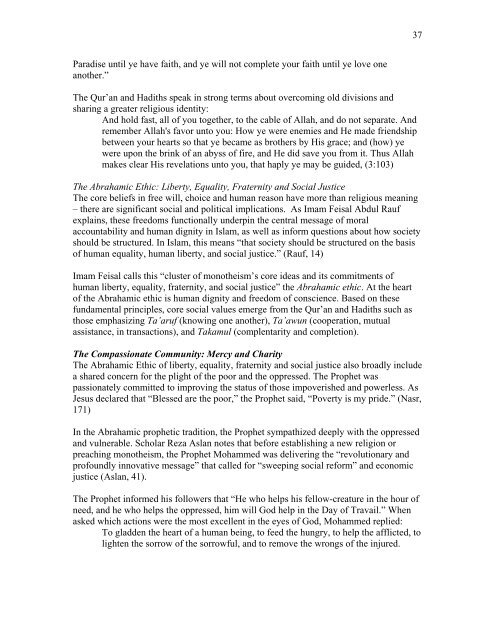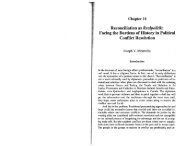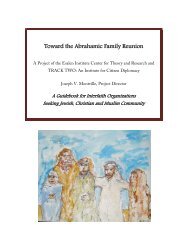The Ethics and Pro-Social Values in Judaism, Christianity and Islam ...
The Ethics and Pro-Social Values in Judaism, Christianity and Islam ...
The Ethics and Pro-Social Values in Judaism, Christianity and Islam ...
Create successful ePaper yourself
Turn your PDF publications into a flip-book with our unique Google optimized e-Paper software.
37<br />
Paradise until ye have faith, <strong>and</strong> ye will not complete your faith until ye love one<br />
another.”<br />
<strong>The</strong> Qur’an <strong>and</strong> Hadiths speak <strong>in</strong> strong terms about overcom<strong>in</strong>g old divisions <strong>and</strong><br />
shar<strong>in</strong>g a greater religious identity:<br />
And hold fast, all of you together, to the cable of Allah, <strong>and</strong> do not separate. And<br />
remember Allah's favor unto you: How ye were enemies <strong>and</strong> He made friendship<br />
between your hearts so that ye became as brothers by His grace; <strong>and</strong> (how) ye<br />
were upon the br<strong>in</strong>k of an abyss of fire, <strong>and</strong> He did save you from it. Thus Allah<br />
makes clear His revelations unto you, that haply ye may be guided, (3:103)<br />
<strong>The</strong> Abrahamic Ethic: Liberty, Equality, Fraternity <strong>and</strong> <strong>Social</strong> Justice<br />
<strong>The</strong> core beliefs <strong>in</strong> free will, choice <strong>and</strong> human reason have more than religious mean<strong>in</strong>g<br />
– there are significant social <strong>and</strong> political implications. As Imam Feisal Abdul Rauf<br />
expla<strong>in</strong>s, these freedoms functionally underp<strong>in</strong> the central message of moral<br />
accountability <strong>and</strong> human dignity <strong>in</strong> <strong>Islam</strong>, as well as <strong>in</strong>form questions about how society<br />
should be structured. In <strong>Islam</strong>, this means “that society should be structured on the basis<br />
of human equality, human liberty, <strong>and</strong> social justice.” (Rauf, 14)<br />
Imam Feisal calls this “cluster of monotheism’s core ideas <strong>and</strong> its commitments of<br />
human liberty, equality, fraternity, <strong>and</strong> social justice” the Abrahamic ethic. At the heart<br />
of the Abrahamic ethic is human dignity <strong>and</strong> freedom of conscience. Based on these<br />
fundamental pr<strong>in</strong>ciples, core social values emerge from the Qur’an <strong>and</strong> Hadiths such as<br />
those emphasiz<strong>in</strong>g Ta’aruf (know<strong>in</strong>g one another), Ta’awun (cooperation, mutual<br />
assistance, <strong>in</strong> transactions), <strong>and</strong> Takamul (complentarity <strong>and</strong> completion).<br />
<strong>The</strong> Compassionate Community: Mercy <strong>and</strong> Charity<br />
<strong>The</strong> Abrahamic Ethic of liberty, equality, fraternity <strong>and</strong> social justice also broadly <strong>in</strong>clude<br />
a shared concern for the plight of the poor <strong>and</strong> the oppressed. <strong>The</strong> <strong>Pro</strong>phet was<br />
passionately committed to improv<strong>in</strong>g the status of those impoverished <strong>and</strong> powerless. As<br />
Jesus declared that “Blessed are the poor,” the <strong>Pro</strong>phet said, “Poverty is my pride.” (Nasr,<br />
171)<br />
In the Abrahamic prophetic tradition, the <strong>Pro</strong>phet sympathized deeply with the oppressed<br />
<strong>and</strong> vulnerable. Scholar Reza Aslan notes that before establish<strong>in</strong>g a new religion or<br />
preach<strong>in</strong>g monotheism, the <strong>Pro</strong>phet Mohammed was deliver<strong>in</strong>g the “revolutionary <strong>and</strong><br />
profoundly <strong>in</strong>novative message” that called for “sweep<strong>in</strong>g social reform” <strong>and</strong> economic<br />
justice (Aslan, 41).<br />
<strong>The</strong> <strong>Pro</strong>phet <strong>in</strong>formed his followers that “He who helps his fellow-creature <strong>in</strong> the hour of<br />
need, <strong>and</strong> he who helps the oppressed, him will God help <strong>in</strong> the Day of Travail.” When<br />
asked which actions were the most excellent <strong>in</strong> the eyes of God, Mohammed replied:<br />
To gladden the heart of a human be<strong>in</strong>g, to feed the hungry, to help the afflicted, to<br />
lighten the sorrow of the sorrowful, <strong>and</strong> to remove the wrongs of the <strong>in</strong>jured.




